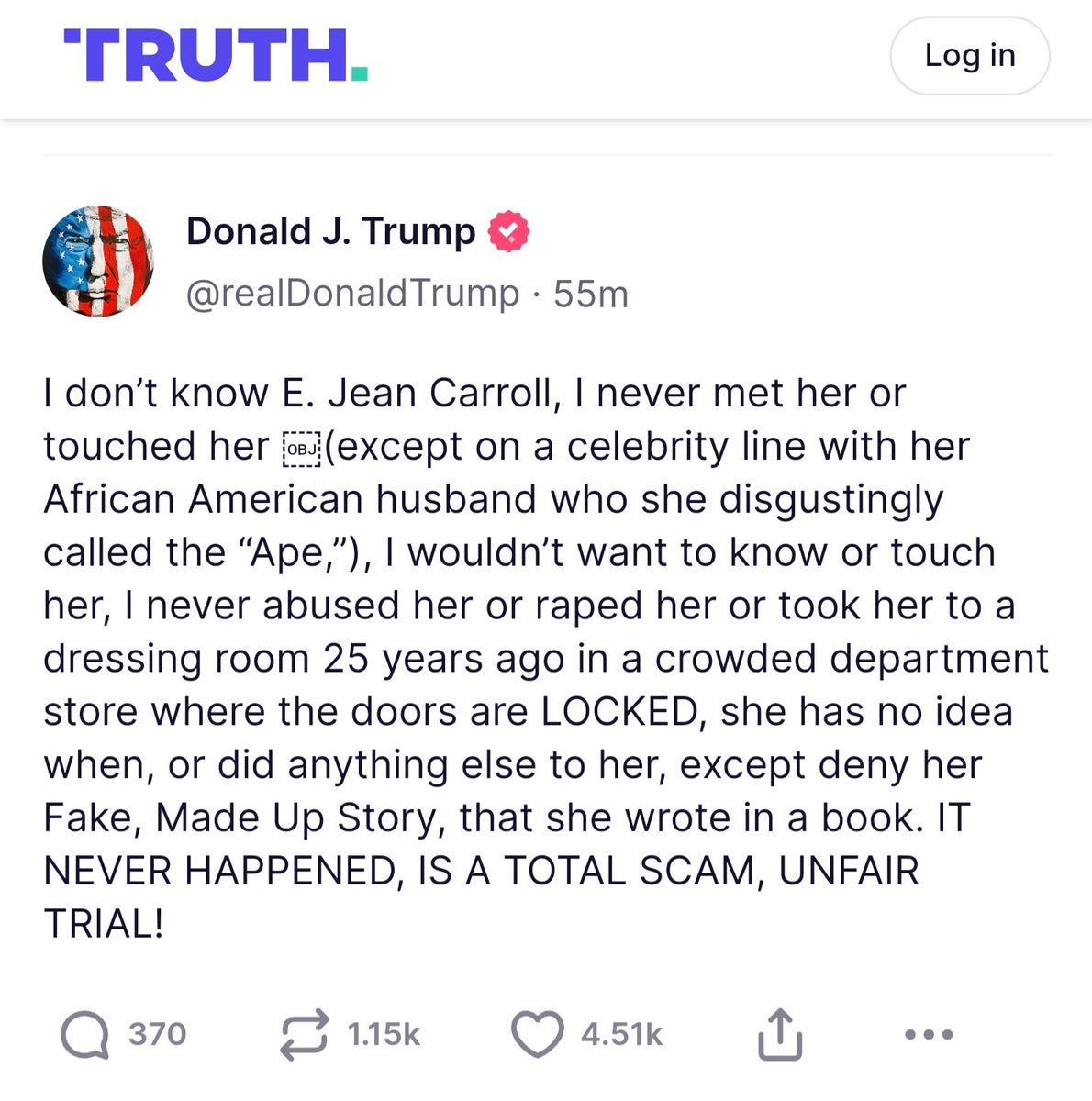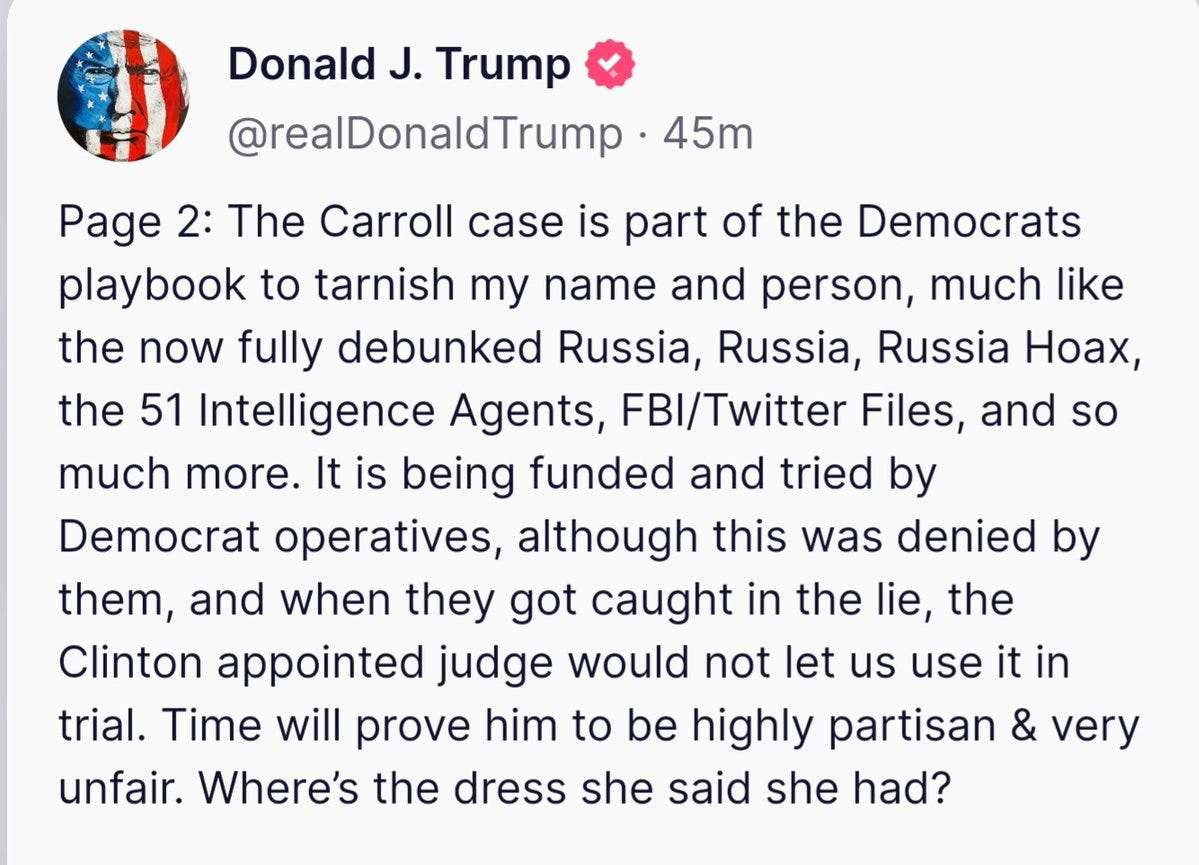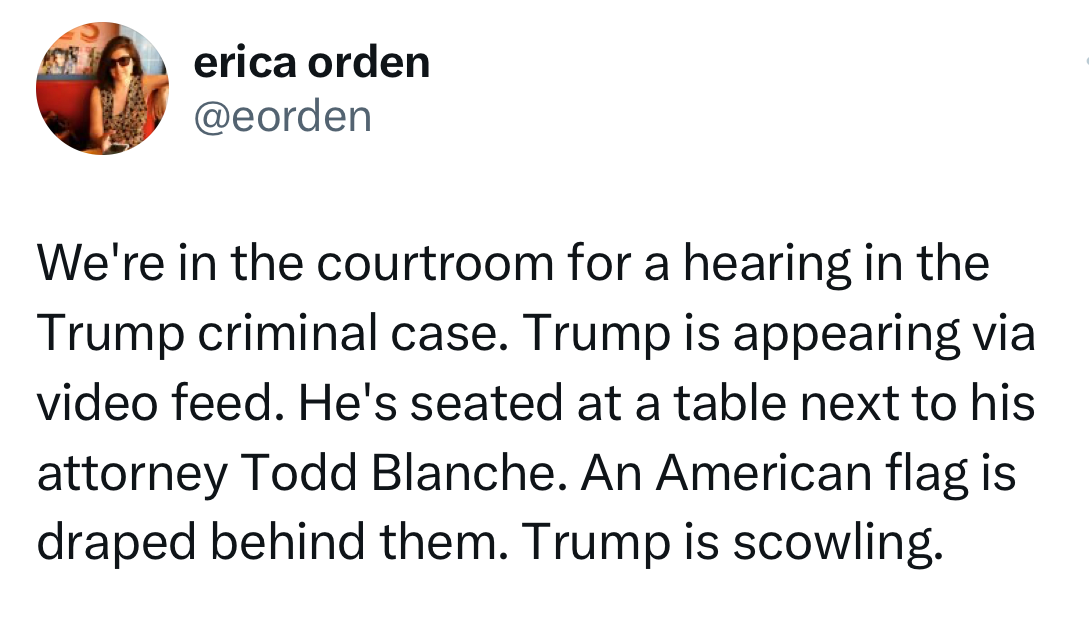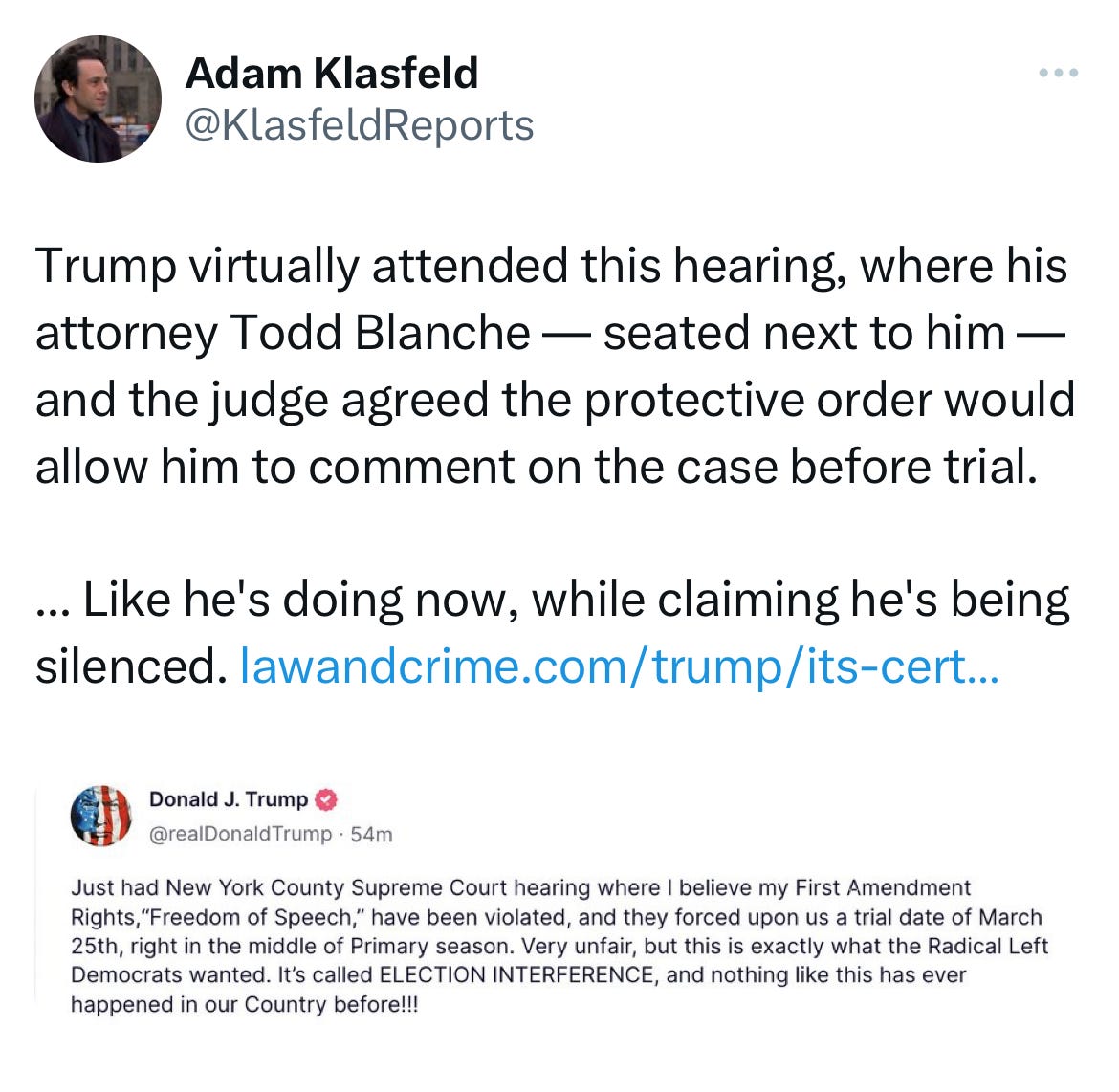In a fitting start to the day, the first news of the morning was that the twice-impeached, indicted former president, recently held responsible by a jury for defamation and civil assault, was at it again.
Last night we looked at the jury instruction on damages that was used in E. Jean Carroll’s first trial against Donald Trump. It informed the jury that they could issue punitive damages in an amount that would punish Trump for his conduct and deter future conduct. Five million dollars, apparently, was not enough, which bodes well for Carroll in her remaining case.
Next up was the hearing in the criminal case where Trump stands indicted by the Manhattan DA, which he attended by video. First up, setting a trial date. Trial will commence on March 24, 2024. Folks in the courtroom said it sounded like a firm date, with the judge saying he expected the trial to go out then. Ten months is ample time to address discovery and other pre-trial issues the former president may wish to litigate in advance, which is sure to include a motion arguing the case should be dismissed because of abuse of prosecutorial discretion (the “it’s a witch hunt” argument).
The Judge also confirmed what he said in his order: that Trump is free to talk about the lawsuit and that his First Amendment rights are not being restrained. The judge entered a limited order restricting anyone from circulating information about witnesses or other evidence the prosecution provides to Trump in discovery. Trump acknowledged he had received and reviewed the protective order barring him from disclosing certain evidence. But there is no gag order. The Judge specifically assured Trump, so there could be no mistake, that he has a right to speak about the case as he campaigns and otherwise.
Easy peasy, right?
Wrong. It didn’t take Trump long to hit social media again.
Judges are notoriously patient with criminal defendants. They want to assure them a fair trial. They don’t want to do anything that could lead to a conviction being reversed on appeal. There are good reasons, for the most part, to let it go unless a defendant is threatening witnesses, trying to influence jurors, etc. But Trump is unique in the sense that he has a large megaphone strapped to his mouth, whether he’s posting on social media or speaking to the country on cable news. And there’s a real risk of jury taint when one thing happens in court and a defendant blatantly lies about it just hours later. Trump is not an ordinary defendant, and no one, least of all the judges he’s encountering this year, are surprised.
With lots of lawsuits against him in progress simultaneously and the prospect of more indictments to come, judges will have to use the tools at their disposal wisely to ensure justice is done. The one thing we can count on is that Trump will continue to tell lies and no one in the Republican Party will do anything to correct the lies or expel the liar, who is the current front-runner for the once-grand old party’s presidential nomination.
Of all the cases, civil and criminal, in play against Trump, the one that seems the most pressing and that we’ve learned the most about over the course of the past couple of weeks is the Mar-a-Lago documents case. It’s important to understand what the news we are getting involves. The reports come from some excellent journalists trying to read the tea leaves about where the investigation stands. But we are not hearing officially or directly from the people making the calls on any prosecution—that would be Jack Smith and his team, with oversight from the Deputy Attorney General and the Attorney General. So far, they are not telling us where the investigation stands.
While the information we’re learning about what evidence prosecutors have is interesting, it’s not an authoritative, official view of the government’s case or, most importantly, whether or not there will be indictments. The facts that led to the documents investigation are compelling. It seems likely that charges are being seriously considered. But exactly what they will look like or what the timeline is remains uncertain. It could happen at any time, or not at all.
Here are some of the newest developments:
The Wall Street Journal is reporting that the investigation is winding down. While winding down an investigation could mean an indictment is imminent, it could also mean that the grand jury investigation is complete but the final form of the indictment is still being negotiated or legal issues need to be resolved. It could mean that buy-in from stakeholders is pending, and in an Espionage Act case there is always the difficulty of determining whether there are classified materials that can be made available as evidence without damaging national security. It’s not clear just how close to indictment “winding down” is. But the reporting has been fast and furious, with lots of interesting details about evidence prosecutors may have.
There has been reporting that suggests the special counsel is making progress, like the story earlier this month suggesting that DOJ had a new witness inside of Mar-a-Lago. If a witness like that could help prosecutors establish that Trump was directing the movement of boxes to prevent his lawyer from searching them, prosecutors would be in business. While that is one possible interpretation of reporting about Trump’s valet Walt Nauta’s movement of boxes and refusal to cooperate with the government, again it’s unclear. Gaps in tapes can reflect old systems that have operating issues or they can result from intentional efforts to obstruct an investigation.
The National Archives, which has been a big player in the documents case, appears to have 16 items that could help to establish that Trump was aware he had an obligation to return government documents, even if they weren’t classified, to the Archives. When you’re looking for proof beyond a reasonable doubt of a defendant’s knowledge and intent, you don’t want to rely on just one piece of evidence. For this key element of a case, you want multiple pieces of evidence that will lead jurors, when they deliberate, to reflect that while one piece of evidence could be misconstrued, when you have multiple people or documents confirming a defendant understood his obligations and nonetheless failed to comply, there are no reasonable doubts left.
A recent report suggests the special counsel sent subpoenas to foreign countries to obtain information about Trump’s business dealings with them. The countries include France, Turkey, China, and the United Arab Emirates. I tweeted my thoughts about that. There is some reporting suggesting they came up empty-handed, but really, at this point, only the team that makes decisions about whether or not to prosecute knows.
Some of this could be what’s popularly called “tickling the wire,” or taking investigative steps to see how targets respond. Who does the target speak with after he learns something new about an investigation? But tonight, I was on MSNBC with the Washington Post’s Devlin Barrett, who used a phrase about prosecutors who like to play with their food that reminded me of one of my supervisors as a young prosecutor. He used to say, “You’ve got enough on your plate; it’s time to quit playing with your food” when he believed you’d reached the point where you had sufficient evidence to indict.
We don’t know for certain whether Jack Smith thinks his plate is full, but Trump’s lawyers seem to. Today they sent a letter to Attorney General Merrick Garland asking for a meeting. This is not unusual in a normal case where there is no special counsel, especially in significant white-collar or public corruption cases, and good prosecutors want to give defense lawyers a fair hearing to ensure they haven’t missed anything. But here, special counsel Jack Smith is in charge of the case and Trump’s lawyers want to discuss what they characterize as the “unfair” treatment Trump has received at Smith’s hands.
The Washington Post reports that the letter says, “Unlike President Biden, his son Hunter, and the Biden family, President Trump is being treated unfairly. No President of the United States has ever, in the history of our country, been baselessly investigated in such an outrageous and unlawful fashion. We request a meeting at your earliest convenience to discuss the ongoing injustice that is being perpetrated by your Special Counsel and his prosecutors.”
It’s unlikely that the Attorney General will meet with Trump’s lawyers. But their desperate tactics make it sound like they, at least, believe an indictment is in the works. Whether there is a meeting or not, Garland has been clear that he will accept recommendations from Smith so long as they are not outside the mainstream of how reasonable prosecutors would act. Garland has behaved that same way with regard to the Durham investigation, where he deferred to Durham’s decision to indict two cases, both of which were criticized by experience former prosecutors when they were indicted and both of which resulted in acquittals by juries. Having permitted those recommendations to move forward, it seems highly unlikely that the Attorney General would reject any suggestions by Smith, so long as they are within the realm of reasonableness. With the pace of the reporting picking up, we may find out soon.
We’re in this together,
Joyce










The only way that fat old traitor will be silenced is when they plant him six feet under.
Which can't happen soon enough. The fatal Hamberder, beaned by a stray golf ball, smacked hard with a nine iron, or "died of old age in prison." I don't care how. I just want this worthless piece of excrement to Make America Great Again with his permanent departure.
One thing that amuses me about a case like this is when you see mainstream media outlets offering phrases along the lines of "we reached out to the special counsel's office for comment but received no reply," or words of that nature. Take this to the bank: The first time we'll see and hear Jack Smith speaking in public will be on the day he steps to the lectern -don't call it a podium, please- and begins to outline the charges in the indictment of Trump. I also expect the complaint accompanying the indictment to be at least novella-length.